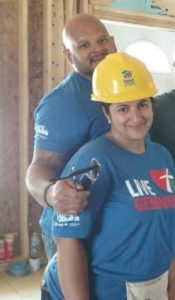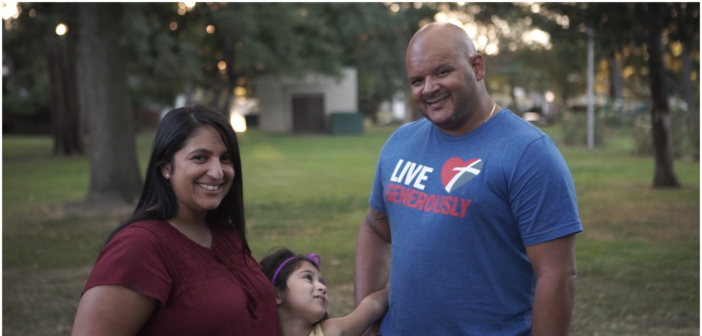Rafael Toledo had a feeling something incredible was about to happen.
Three years prior, Toledo left Brooklyn with his wife and two daughters because his rent was more than $1,600 per month for a cramped two-bedroom apartment.
They decided to start a new life in the Lehigh Valley. They found North Bethlehem. Upon arriving, they searched for a sense of community, something their previous city never offered them.
Toledo, who works for a janitorial company, was trying to save for a down payment on a new home.
The family lived from paycheck to paycheck and rent bill to rent bill.
The cycle was perpetual.
And life had it challenges — medical bills, childcare, grocery bills — preventing Toledo from escaping this cycle.
But then, the Toledo family found Habitat for Humanity.
Since 1989, Habitat for Humanity of the Lehigh Valley has worked to eradicate poverty. Nationally, the organization has provided housing for more than 9.8 million people since 1976.

Rafael Toledo and his family are just one of the numerous families who have benefited from help of Habitat for Humanity. The Toledo family was given the opportunity to build and live in a home provided by the Lehigh Valley chapter, which buys and refurbishes homes in Easton, Allentown and Bethlehem. (Courtesy of Habitat for Humanity of the Lehigh Valley)
Habitat for Humanity’s goal is to improve families’ living conditions by building new homes and refurbishing older homes, allowing residents to pay back the mortgage at a zero percent interest. The Lehigh Valley chapter buys and refurbishes homes in Easton, Allentown and Bethlehem.
After contemplating whether an affordable housing program was right for them, the Toledo family decided to apply. Toledo held out hope that a home would open up on the North Side. He kept praying.
Three years later, Toledo’s phone rang on a frigid winter afternoon in 2015 with good news.
His prayers were answered.
After 18 months of building, structural framing and interior design, the Toledo family moved into their new home in Bethlehem in January 2017.
Hundreds of volunteers changed the Toledo family’s future and helped them build a place they could call their own. As they were building, one volunteer started writing prayers on the drywall and sheetrock. It inspired a chain reaction.
Eventually, all the walls were covered in psalms and Bible scriptures, “To live by faith and not by sight,” and “God will always provide,” were two scriptures Toledo considers most relevant to him.
“Me being a New Yorker, I’ve never felt I was part of something,” Toledo said. “I never have seen a community come together in a place where people don’t even know you. It’s incredible that an organization just comes together and builds a house for people they barely even know.”
The funding and supplies for each home come from personal and corporate donations or Restore, a home improvement center run by Habitat for Humanity in Whitehall.
Restore collects home décor, furniture, appliances and building material donations from local residents and corporations and sells them for profit to buy supplies and equipment for the Habitat homes.
Five years ago, when Joe Foster retired, he started volunteering three days a week at Restore. He always enjoyed working with his hands, and today he helps refurbish donated items for resale.
“It’s very rewarding, and I love the camaraderie,” Foster said.
He has volunteered over 3,900 hours to Habitat for Humanity of the Lehigh Valley, located a few miles from his home — a much different experience from the 93-mile commute to his trucking distribution facility in upstate New York.
“You are giving back to the community,” Foster said. “You are helping people that are less fortunate by selling the product to people at a lower price when they can’t afford to buy brand name furniture or appliances.”
For Foster and hundreds of other volunteers, the goal is to eliminate the incessant cycle of poverty in the Lehigh Valley.
Pennsylvania ranks 20th in the nation for most expensive housing because of its close proximity to major business hubs, such as New York City and Philadelphia.
The 2018 average cost for a two-bedroom apartment in Lehigh County is $1,048 per month. To pay rent, a person or household must make at least $19.96 per hour. An individual would need to work 2.8 minimum wage jobs to afford a two-bedroom home.
People working minimum wage jobs are at a disadvantage when trying to buy affordable housing. The Toledo family is just one of many Lehigh Valley families who pay an above-average rent. Before moving into the Habitat house Toledo was paying 60 percent of his monthly salary toward his rent.
“We know there is this group of people who are working hard and working full time, yet can’t afford an apartment for their family or are in a position to get a house because the housing prices are out of alignment with their income,” said Jessica Elliott, the executive director of Habitat for Humanity of the Lehigh Valley.
In the late 1990s and early 2000s, the Lehigh Valley chapter focused on building more than 20 homes on James and Aaron streets in South Bethlehem, an average of two homes per year. Since then, the program has grown, constructing between three to six houses per year. In the Lehigh Valley, only one of the 143 homes built and refurbished has undergone foreclosure.
Elliott said the homeowner model works well and the key component is the zero percent interest rate on the mortgage. This affordable payment allows families to spend the extra money on food, clothes and educational needs.
Elliott said a safe home environment is not always feasible for many Lehigh Valley families.
“When we get a family out of a bad apartment into a decent house,” Elliott said, “then we know those kids are going to have consistency for the rest of their life.”

Cindy Lyn and Rafael Toledo work at one of the Habitat for Humanity build sites. Once a family qualifies for the program, each individual on the deed is required to complete 250 volunteer hours. (Courtesy of Habitat for Humanity of the Lehigh Valley)
Elliott said families must apply to qualify for the program. The application process consists of having a credit score of 600 or more and meeting income guidelines to pay a monthly mortgage.
Once selected, each individual on the deed is required to complete 250 volunteer hours, either working at Restore, building Habitat homes or working on their own home.
Elliott said these families work hard, often completing sweat equity hours after work — sometimes after two jobs — or on the weekends. She said they are committed to making a positive change in their lives.
Today, Toledo continues to work toward enacting a positive change in his family’s life. He still works at the janitorial company and hopes to pursue other career passions in the future.
“There would be nothing more fulfilling than to pay off the mortgage leaving my children a safe haven, so they don’t have to deal with the struggles I dealt with,” Toledo said. “I can alleviate some of that, so when they get older they can say, ‘My dad didn’t leave us a million dollars, but he left us with a house and stability.’”
When days are especially tough, Toledo remembers the prayers and kind words that are inscribed beneath the layers of paint on his walls from the Habitat volunteers. He remembers the hours of drilling plywood, pounding nails and laughing with new friends.
They are now memories beneath the paint, but he knows they are still there.






Comment policy
Comments posted to The Brown and White website are reviewed by a moderator before being approved. Incendiary speech or harassing language, including comments targeted at individuals, may be deemed unacceptable and not published. Spam and other soliciting will also be declined.
The Brown and White also reserves the right to not publish entirely anonymous comments.